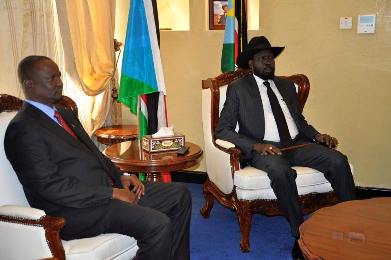South Sudan peace partners conclude selection of ministries for transitional government
January 7, 2016 (JUBA) – South Sudanese parties to the recently signed peace agreement have successfully concluded selection of ministries on Thursday without disagreement on key ministries, dispelling fears and speculations that the parties may not reach consensus on sovereign ministries.

“We the parties to the agreement on the resolution of the conflict in the Republic of South Sudan, without prejudice to the provisions of chapter 1, article 10.5 of the said agreement, on the selection of the ministries and appointment procedure for the ministers and deputy ministers, have agreed by consensus on the allocation of the ministries,” declared the parties in the letter, dated 7 January, containing the selected ministries, seen by Sudan Tribune.
The parties, in accordance with the executive power sharing provisions of quotas, resolved to allow the government to take the 16 ministries of defence and veteran affairs; finance and planning; justice and constitutional affairs; information, communications technology and postal services; minister in the office of the president; trade and industry; wildlife conservation and tourism’ roads and bridges; parliamentary affairs; national security; health; culture, youth and sports; gender, child and social welfare; general education and instructions; livestock and fisheries as well as the ministry of environment and forestry.
The armed opposition faction of the Sudan People’s Liberation Movement (SPLM-IO) under the leadership of the first vice-president designate, Riek Machar, agreed to take 10 national ministries as follows: petroleum; federal affairs; interior; water resources and irrigation; labour, public service and human resources development; higher education, science and technology; humanitarian affairs and disaster management; land, housing and urban development; energy and dams as well as mining.
The former detainees took the ministry of foreign affairs and international cooperation as well as transport while other political parties took the ministries of cabinet affairs; and agriculture and food security.
Sources close to the process told Sudan Tribune the first vice-president designate, Riek Machar, may soon be appointed by president Salva Kiir in accordance with the peace agreement, hence to be followed by formation of a transitional government of national unity by 22 January 2016 as scheduled by the Joint Monitoring and Evaluation Commission (JMEC).
The selection of the divisions of the ministerial portfolios is seen as a giant step towards formation of the government which will administer the country for the next 30 months at the end of which a general election will be conducted.
The August peace agreement ended 21 months of violent conflict which erupted on 15 December 2013.
(ST)
